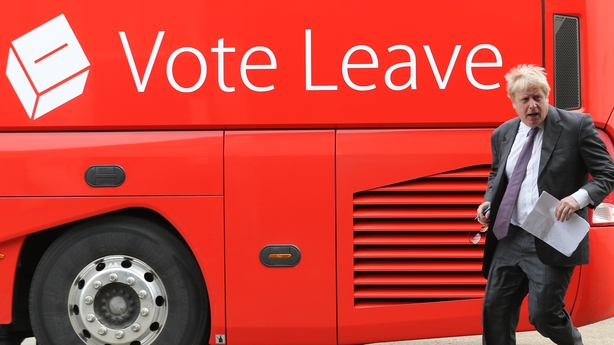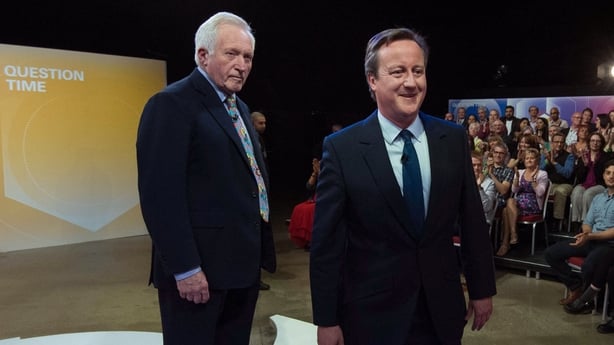A former Conservative party chairperson has switched her support from Leave to Remain in the British EU referendum debate, complaining that moderate voices in the Brexit campaign have been drowned out by "lies and xenophobic campaigning".
Baroness Sayeeda Warsi said her decision to change sides was sparked by an "indefensible" poster released by UKIP leader Nigel Farage, as well as "lies" from Michael Gove over the prospect of Turkey joining the European Union.
But her defection was greeted with bemusement by the Leave campaign, with senior figures saying they were not aware that she had been a supporter.
The development came as MPs gathered in Westminster for a recall of Parliament to pay their respects to Labour MP Jo Cox, whose death on Thursday led to a pause in the EU referendum battle.
Campaigning is now expected to get back into full swing, with both sides making a final push for support in what appears to be a knife-edge vote.
Leading Leave campaigner Boris Johnson issued an appeal for voters to "change history" in the 23 June vote.
Writing in The Telegraph, the former London mayor said the country was facing a "moment of fundamental decision" with a chance to transform Britain's democratic arrangements for the better.

"Now is the time to believe in ourselves, and in what Britain can do, and to remember that we always do best when we believe in ourselves," he said. "This chance will not come again in our lifetimes, and I pray we do not miss it.
"You can change the whole course of European history - and if you vote Leave, I believe that change will be overwhelmingly positive."
Baroness Warsi - who was the first Muslim woman to attend cabinet but quit the government in 2014 over the Gaza conflict, announced her defection in The Times, saying she could not support a campaign that included the UKIP "Breaking Point" poster depicting a column of migrants walking through the European countryside.
She later told the BBC Radio 4 Today programme: "This kind of nudge-nudge, wink-wink xenophobic racist campaign may be politically savvy or politically useful in the short term, but it causes long-term damage to communities.
"The vision that me and other Brexiteers who have been involved right from the outset, who had a positive outward-looking vision of what a Brexit vote might mean, unfortunately those voices have now been stifled and what we see is the divisive campaign which has resulted in people like me and others who are deeply Eurosceptic and want to see a reformed relationship feel that they now have to leave Leave."
Brexit: Key claims from both sides
Nobel economists warn UK of lasting damage from Brexit
Baroness Warsi said she had argued for a "Hello World" approach to the Leave campaign, stressing "an optimistic vision of where Britain stands in the world, how it trades freely and is open to the brightest and best from around the world and is rooted in its humanitarian instinct".
Senior Leave supporter and Conservative MEP Daniel Hannan questioned whether the Tory peer had been part of the Brexit campaign, saying: "When I invited Sayeeda Warsi to join the Leave campaign, she declined. Fair enough, obviously. But how is this a 'defection'?"
And prominent Brexit camaigner Toby Young asked: "Was Warsi on our side? Who knew?"
But Baroness Warsi said she had spoken for Brexit within the last five weeks and promoted Leave in the media four weeks ago.
"I've been making the case for leave long before Vote Leave had even formally been established, campaigning for Brexit last summer, building the foundation of bringing on different communities to make sure that their voice too would be heard in this Brexit campaign," she said.

Baroness Warsi's announcement came the morning after British Prime Minister David Cameron's final TV set piece of the referendum campaign, as he faced an often hostile grilling from members of the public on BBC One's Question Time in Milton Keynes.
Mr Cameron was clearly stung by one man in the audience who likened him to a "21st Century Neville Chamberlain waving a piece of paper in the air saying to the public 'I have this promise"' - a reference to the appeasement of Hitler in the 1930s.
He rejected the comparison of the EU to a "dictatorship" and invoked the wartime spirit of Winston Churchill to urge voters to carry on the fight for British values within Europe.
"I don't think Britain at the end is a quitter. I think we stay and fight. That is what we should do. That is what made our country great and that's how it will be great in the future," he said.

